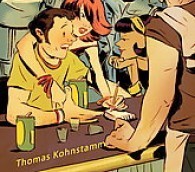Tag: Travel Writing Ethics
Gawker Goes on a Vegas Press Trip
by Eva Holland | 01.27.12 | 2:10 PM ET
And lays the snark on thick in a dispatch, Among the Junketeers. Here’s a taste:
Though the Hilton was not objectively dirty, it was permeated by a certain sort of gloom that is the result of mixing dim lighting and snack bar food and huge television screens and losing betting slips together in close proximity and marinating for 20 years or so. “I think I’m a smart sports bettor, but I always lose,” said the TSN reporter to Kornegay at one point, obviating the need for a longer discussion here of how sports books in Las Vegas make their money.
Off to lunch at The Barrymore, a newly renovated spot with stylish wallpaper and mirrored walls and a ceiling made entirely of movie reels. On the way over we drove by Occupy Las Vegas, a grim collection of tents huddled on a cracked asphalt lot, like an obstinate little Hooverville. We did not stop. The manager at The Barrymore, shirt opened to the third button, came over to greet us. We had an entire room to ourselves. They filled the table with calamari and thinly sliced pork and every other appetizer on the menu, something which would be repeated in nearly every restaurant where we ate. The journalists had a bunch of cocktails, something which would also be repeated in nearly every restaurant. I neither drink nor eat meat, so I sat there eating my French onion soup and drinking coffee like a human sign reading “PARTY POOPER.” This would also be repeated in nearly every restaurant. The French onion soup was very good.
The press trip issue has been chewed over plenty (see: this, this, or, say, this), but I enjoyed this first-person, on-the-ground addition to the genre.
(Via @mikebarish)
Endless Travel Writing Ethics Debate Gets Kindle Singled
by Michael Yessis | 08.09.11 | 12:41 PM ET
Mike Albo, the freelancer who mused about feeling like a “guppy who is being eaten by his mother” after being outed as a taker of press trips, has fictionalized his experience and put it up for sale as a Kindle Single.
“I was perilously close to exposing a secret underground economy of promotion: favors and junkets and banquets and gifts that keeps the city in motion, and keeps underpaid writers at work,” Albo writes. “Basically, I became the Silkwood of Swag.”
BP to Spend Millions on Louisiana Tourism Promotion
by Jim Benning | 11.02.10 | 5:12 PM ET
The funds, totaling $78 million, will also help promote the Louisiana seafood industry.
According to Business Week:
BP has paid out $87 million to Gulf Coast states for tourism promotion, and has so far committed to an additional $30 million to Louisiana. The company has also promised $68 million to Louisiana and Florida for seafood testing and product marketing.
I wonder whether any of that money will help fund travel-writer junkets to the region. As we noted in September, some BP money already has, prompting a debate about the ethics of a such a trip.
Travel Writing Today: ‘Public Relations Bull’?
by Jim Benning | 10.28.10 | 11:59 AM ET
I love this. New York Times Frugal Travel columnist Seth Kugel just interviewed John Wilcock, who, in addition to editing travel stories at the New York Times in the 1950s, wrote “Mexico on $5 a Day” and “Japan on $5 a Day” in the 1960s.
Among the highlights:
You wrote in the 1970s that most most travel writing is just “public relations bull.” Is that true today?
Things have changed a lot since then. One of the things I’d like to claim is that the underground press changed the nature of almost all newspaper and magazine writing. Travel writing today is much more interesting than it was in those days. When I was working at The Times everything was incredibly impersonal. Basically, you weren’t allowed to have an opinion at all. And nowadays it’s almost the reverse, almost everything is written from the personal point of view. So things have changed tremendously.
All true. And yet, let’s be honest: There’s still plenty of public relations bull out there.
BP Dollars Fund Travel Writer Junket to Gulf Coast*
by Jim Benning | 09.30.10 | 2:50 PM ET
Tourism boards often invite travel writers to visit places, all expenses paid, hoping for positive coverage.
The practice has always raised ethical concerns, but a recent junket to the Gulf Coast is drawing more critical attention than usual because the funding originated with BP. The oil company gave $551,000 to the Santa Rosa County Tourist Development Council, and the council used a small portion of it to bring six travel writers to Florida’s Navarre Beach region. According to an article in the Pensacola News Journal (a Los Angeles Times blog has also picked up the story), they were “chauffeured around in a limo” and put up in condominiums “to get the word out that this summer’s BP oil spill is over, and the beach, along with the rest of Santa Rosa County, is open for tourism.”
According to the same article, the writers worked for publications such as Baton Rouge Parents, the Houston Tribune, Southern Hospitality Magazine, PlanetEyeTraveler.com, UPTake.com and JustSayGo.com.
Among the writers on the trip was Ron Stern, who wrote an article for JustSayGo.com raving about his visit.
After checking in, I wasted no time and headed out to check the beach and water conditions. As I suspected, what I found was a beautiful white sand beach (actually comprised of quartz) with no visible tar. I waded out into the emerald-green water and looked for any signs of smelly, slimy oil. Nope, nothing except for some swimmers, seagulls and families enjoying the sunshine, gorgeous water and clean shores. So much for everything I had been hearing and seeing, at least in Navarre.
Kate Wilkes, the executive director of the Santa Rosa County Tourist Development Council, told me she was happy to be able to bring writers to the area. Not every place in the Gulf suffered the same kind of damage from the oil spill, she said. Little oil is to be found on Navarre Beach, yet visits have plummeted and the area has seen bed tax dollars drop 40 percent in the last year. Local businesses are hurting.
“The national news made it sound like we were all covered with oil and dead pelicans,” she said. “My job is to make sure that as long as it’s safe and a good place to take a vacation, that people know about it.”
Was she troubled by the fact that coverage of the trip could also play into BP’s public relations campaign?
“They created this mess and it ruined peoples’ lives,” she said. “Our summer season was crippled. We know from the hurricanes that it can take two or three years to come back from these things. They need to help make people whole.”
She added, “If it helps BP, there won’t be a moment that I’ll say BP has done their job and we’re all square. It could be three years before we can say that.”
She didn’t know whether the writers were aware their trips were funded by BP. Had they asked, she said, they would have been told, adding, “There are certainly no secrets about it.”
Update: 4:12 p.m. ET: I just spoke with Ron Stern, who wrote the JustSayGo.com story.
He said he didn’t know at the time he was on the trip that funding for it had come from BP. Had he known, he would have stayed home: “For perception purposes, I wouldn’t have taken the trip.”
Nevertheless, he’s not sure this trip raises any new questions about junkets and ethics just because it was funded by BP.
“The reality is you could make the same argument about any press trip,” he said. “Do press trips compromise objectivity? Nobody tells me what to think or write and I wrote it as I saw it.”
He said he finds some of the coverage about the trip “extremely offensive” because it suggests the writers were beholden to BP and “in their pocket.” That, he said, wasn’t the case.
Traveling (and Writing) Free and Easy
by Tom Swick | 01.21.10 | 11:50 AM ET
On press trips and the ethics of travel writing in the digital age
NYT Freelancer Gets the Axe
by Eva Holland | 10.27.09 | 10:17 AM ET
Last week’s “swag orgy” controversy has ground to a conclusion: Freelancer Mike Albo has had his shopping column cut by the New York Times after violating the paper’s ethics agreement. Weirdly, Gawker—the blog that helped force the Times’ hand—now apparently thinks the firing is too harsh.
I’ll give Mike Albo the last word once again. He told New York Magazine: “I look forward to trying on cashmere sweaters I can’t afford for other publications.”
Endless Travel Writing Ethics Debate Gets Gawkerized*
by Eva Holland | 10.22.09 | 12:12 PM ET
And here I thought only our little corner of the writing community cared about the ongoing press trip debate. Apparently not. Yesterday, Daily Finance outed New York Times contributor Mike Albo as a taker of press trips, describing Albo’s recent Jamaica junket as a “swag orgy.” Now Gawker’s gotten involved, too, pointing out to the Times’ higher-ups that one of their freelancers was in violation of their no-freebies policy. The Times has acknowledged that the paper has “concerns” about the trip.
As for Mike Albo? Here’s his latest tweet: “do you ever feel like you are a guppy who is being eaten by his mother?”
*Update 12:59 p.m. ET: We’re debating the issue on Twitter at #twethics.
The Critics: ‘Confessions of a Travel Writer’*
by Eva Holland | 08.11.09 | 5:02 PM ET
So “Confessions of a Travel Writer” debuted last night, and the response—at least from the commenters on our interview with host Charles Runnette—has been ... colorful. But what did Runnette’s fellow travel writers think? I dipped into the blogs and my Twitter stream to find out.
Press Trips: ‘Too Much Noisy Fun, Too Little Job Satisfaction’
by Eva Holland | 10.02.08 | 12:49 PM ET
Usually, when travel writers criticize the press junket phenomenon, they focus on the ethical issues involved. Not so for the Telegraph’s Paul Mansfield, who takes aim at the actual substance of the typical press trip in this fun essay. “The atmosphere is like a school trip,” he writes, “competitive, cliquey, with a tendency towards booze-fuelled indiscretions and adolescent mischief.”
‘The Worst Guidebook Writer Ever’?
by Robert Reid | 04.18.08 | 11:21 AM ET
Lonely Planet author Robert Reid reviews Thomas Kohnstamm's "Do Travel Writers Go to Hell?" and weighs in on the controversy surrounding it
Thomas Kohnstamm, Lonely Planet and the Question of Eternal Damnation
by Jim Benning | 04.14.08 | 6:23 PM ET
Some writers have declared that former Lonely Planet author Thomas Kohnstamm just might be going to hell. Others charge that he’s a fraud. My take: The author of the new book Do Travel Writers Go to Hell?, about his not-so-ideal experience in the travel-writing business, has said some stupid things (which he regrets). His publisher is playing up his book’s salacious details. And he may not win a Nobel Peace Prize or lifetime achievement award. But he’ll escape eternal damnation—at least on travel-writing grounds. We just posted an interview with him covering the high points of the controversy (with links to a number of stories about it). And we got to the sex stuff, too.
Thomas Kohnstamm’s Lonely Planet: The Firestorm Around ‘Do Travel Writers Go to Hell?’
by Frank Bures | 04.14.08 | 6:16 PM ET
The author of a new book that purports to explore the underside of travel writing is taking a lot of hits. Frank Bures asks him about the controversy he's stirred up and his take on the guidebook industry.
- « Prev Page
- Next Page »


